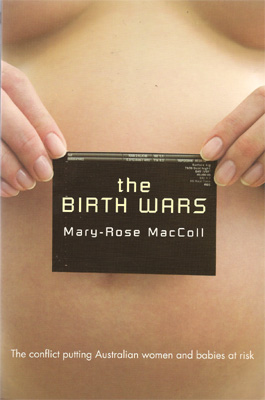The Birth Wars

The Birth Wars
Entrenched conflict in maternity care is currently putting Australian women and their families at risk, says the author of a new book The Birth Wars.
Doctors and midwives need to work together to provide the best possible birth experience for families and women need to be included in the decision mix, but this rarely happens in current maternity care.
The Birth Wars draws on research, statistics and interview nationally with clinicians, health administrators and homebirth advocates, as well as the personal stories of women, to explore the growing schism in philosophies of maternity care in Australia.
The 'mechanics', mostly doctors, argue for the need for access to technology and expertise for dealing with the unforeseeable risks of pregnancy and birth. The 'organics', many of whom are midwives, see pregnancy as a normal life event and believe labour should mostly take its own course.
Author Mary-Rose MacColl worked on a review of maternity services in Queensland in 2004. "Wo0men are told they have choices about their care," MacColl said. "But in reality the only choice they have is which side of the birth wars they will be on. And they may not even be aware they are making this choice, despite the fact it will affect their whole lives and their children's lives."
"Women can go into the hospital system and face a whole range of interventions they may not want or need- everything from induction of labour to epidurals to caesareans is going up every year. Or they can seek an alternative- birth centre or homebirth care- and right now, in these models, with the birth wars the way they are, I'm not sure they can be assured they will be safe," MacColl said.
"Birth centres often operate by locking out medicine, and so necessary medical care may be withheld or too late. What's worse, when women do transfer from home or birth centre to hospital, they may be published."
For one family, the consequences were tragic, says MacColl who details the birth and subsequent death of baby Lillienne and how that could have been prevented.
"Both parents, Debra and her husband Calvin, want to make sure the same thing enverhappsn to anyone else," she says in the book.
Commonwealth Health Minister Nicola Roxon is set to give midwives more autonomy from 2010 based on models where midwives work 'in collaboration' with doctors.
But MacColl says the chances of midwives and doctors collaborating in the current climate of maternity care are slim.
"The two Colleges involve din maternity care- obstetricians and midwives- can't even agree on guidelines for transfer from one kind of carer to another. Midwives are cast as witches and demons. Obstetricians are maligned for their golf-driven caesareans. None of this helps."
"Unless something is done to address the entrenched conflict at the heart of maternity care currently, there will be no positive changes for women we'll just move to a new theater of war."
In The Birth War MacColl:
Doctors and midwives need to work together to provide the best possible birth experience for families and women need to be included in the decision mix, but this rarely happens in current maternity care.
The Birth Wars draws on research, statistics and interview nationally with clinicians, health administrators and homebirth advocates, as well as the personal stories of women, to explore the growing schism in philosophies of maternity care in Australia.
The 'mechanics', mostly doctors, argue for the need for access to technology and expertise for dealing with the unforeseeable risks of pregnancy and birth. The 'organics', many of whom are midwives, see pregnancy as a normal life event and believe labour should mostly take its own course.
Author Mary-Rose MacColl worked on a review of maternity services in Queensland in 2004. "Wo0men are told they have choices about their care," MacColl said. "But in reality the only choice they have is which side of the birth wars they will be on. And they may not even be aware they are making this choice, despite the fact it will affect their whole lives and their children's lives."
"Women can go into the hospital system and face a whole range of interventions they may not want or need- everything from induction of labour to epidurals to caesareans is going up every year. Or they can seek an alternative- birth centre or homebirth care- and right now, in these models, with the birth wars the way they are, I'm not sure they can be assured they will be safe," MacColl said.
"Birth centres often operate by locking out medicine, and so necessary medical care may be withheld or too late. What's worse, when women do transfer from home or birth centre to hospital, they may be published."
For one family, the consequences were tragic, says MacColl who details the birth and subsequent death of baby Lillienne and how that could have been prevented.
"Both parents, Debra and her husband Calvin, want to make sure the same thing enverhappsn to anyone else," she says in the book.
Commonwealth Health Minister Nicola Roxon is set to give midwives more autonomy from 2010 based on models where midwives work 'in collaboration' with doctors.
But MacColl says the chances of midwives and doctors collaborating in the current climate of maternity care are slim.
"The two Colleges involve din maternity care- obstetricians and midwives- can't even agree on guidelines for transfer from one kind of carer to another. Midwives are cast as witches and demons. Obstetricians are maligned for their golf-driven caesareans. None of this helps."
"Unless something is done to address the entrenched conflict at the heart of maternity care currently, there will be no positive changes for women we'll just move to a new theater of war."
In The Birth War MacColl:
Mary-Rose MacColl
The Birth Wars
University of Queensland Press
Author: Mary-Rose MacColl
ISBN: 9780702237225
Price: $32.95
MORE



